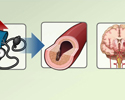High blood pressure medicines
Hypertension - medicines
Information
Treating high blood pressure will help prevent problems such as heart disease, stroke, loss of eyesight, chronic kidney disease, and other blood vessel diseases.
High blood pressure
Blood pressure is a measurement of the force exerted against the walls of your arteries as your heart pumps blood to your body. Hypertension is the ...
You may need to take medicines to lower your blood pressure if lifestyle changes are not enough to bring your blood pressure to the target level.
WHEN ARE MEDICINES FOR HIGH BLOOD PRESSURE USED
Most of the time, your health care provider will try lifestyle changes first and check your BP 2 or more times. Medicines will likely be started if your BP readings remain at or above these levels:
- Top number (systolic pressure) of 140 or more in people younger than 60 years
- Top number of 150 or more in people 60 years and older
- Bottom number (diastolic pressure) of 90 or more
If you have diabetes, heart problems, or a history of a stroke, medicines may be started at lower blood pressure reading. The most commonly used blood pressure targets for people with these medical problems are below 130 to 140/80 mmHg.
MEDICINES FOR HIGH BLOOD PRESSURE
Most of the time, only a single drug will be used at first. Two drugs may be started if your
- Systolic BP is above 160
- Diastolic BP is above 100
Several types of medicine are used to treat high blood pressure. Your provider will decide which type of medicine is right for you. You may need to take more than one type.
Each type of blood pressure medicine listed below comes in different brand and generic names.
One or more of these blood pressure medicines are often used to treat high blood pressure:
- Diuretics are also called water pills. They help your kidneys remove some salt (sodium) from your body. As a result, your blood vessels do not have to hold as much fluid and your blood pressure goes down.
- Beta-blockers make the heart beat at a slower rate and with less force.
- Angiotensin-converting enzyme inhibitors (also called ACE inhibitors ) relax your blood vessels, which lowers your blood pressure.
- Angiotensin II receptor blockers (also called ARBs ) work in about the same way as angiotensin-converting enzyme inhibitors.
- Calcium channel blockers relax blood vessels by stopping calcium from entering cells.
Blood pressure medicines that are not used as often include:
- Alpha-blockers help relax your blood vessels, which lowers your blood pressure.
- Centrally acting drugs signal your brain and nervous system to relax your blood vessels.
- Vasodilators signal the muscles in the walls of blood vessels to relax.
- Renin inhibitors , a newer type of medicine for treating high blood pressure, act by reducing the amount of angiotensin precursors thereby relaxing your blood vessels.
SIDE EFFECTS OF BLOOD PRESSURE MEDICINES
Most blood pressure medicines are easy to take, but all medicines have side effects. Most of these are mild and may go away over time.
Some common side effects of high blood pressure medicines include:
- Cough
- Diarrhea or constipation
- Dizziness or light-headedness
- Erection problems
- Feeling nervous
- Feeling tired, weak, drowsy, or a lack of energy
- Headache
- Nausea or vomiting
- Skin rash
- Weight loss or gain without trying
Tell your provider as soon as possible if you have side effects or the side effects are causing you problems. Most of the time, making changes to the dose of medicine or when you take it can help reduce side effects.
Never change the dose or stop taking a medicine on your own. Always talk to your provider first.
OTHER TIPS
Taking more than one medicine may change how your body absorbs or uses a drug. Vitamins or supplements, different foods, or alcohol may also change how a drug acts in your body.
Always ask your provider whether you need to avoid any foods, drinks, vitamins or supplements, or any other medicines while you are taking blood pressure medicine.
References
James PA, Oparil S, Carter BL, Cushman WC, Dennison-Himmelfarb C, Handler J, et al. 2014 evidence-based guideline for the management of high blood pressure in adults: report from the panel members appointed to the Eighth Joint National Committee (JNC 8). JAMA . 2014 Feb 5;311(5):507-20.
Victor RG. Arterial hypertension. In: Goldman L, Schafer AI, eds. Goldman-Cecil Medicine . 25th ed. Philadelphia, PA: Elsevier Saunders; 2016:chap 67.
Victor RG, Libby P. Systemic hypertension: Treatment In: Mann DL, Zipes DP, Libby P, et al. eds. Braunwald's Heart Disease: A Textbook of Cardiovascular Medicine . 10th ed. Philadelphia, PA: Elsevier Saunders; 2014:chap 44.
-
High blood pressure
(Alt. Medicine)
-
Stroke
(Alt. Medicine)
-
Atherosclerosis
(Alt. Medicine)
-
Myocardial infarction
(Alt. Medicine)
-
Stroke
(In-Depth)
-
Diabetes - type 2
(In-Depth)
-
Diabetes
(Alt. Medicine)
Review Date: 5/3/2015
Reviewed By: Laura J. Martin, MD, MPH, ABIM Board Certified in Internal Medicine and Hospice and Palliative Medicine, Atlanta, GA. Also reviewed by David Zieve, MD, MHA, Isla Ogilvie, PhD, and the A.D.A.M. Editorial team.

